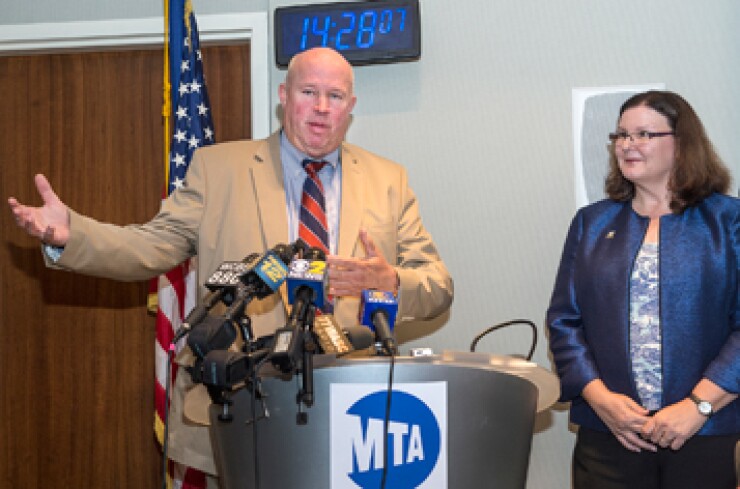
The chairman of the Metropolitan Transportation Authority called on New York Mayor Bill de Blasio to commit $3.2 billion - about five times the city's current commitment -- to the MTA's five-year capital plan.
"Given the state's clear commitment and the need for the MTA to meet unprecedented challenges, we urge the city to stand up for our customers and your constituents by committing to provide $3.2 billion in support for the capital program," Prendergast wrote de Blasio on Tuesday. "We believe our proposal is fair and appropriate."
Prendergast's comments reinforced the request of the city that Gov. Andrew Cuomo made last week and came one day after Cuomo said he would put an additional $8.3 billion for the capital plan in next year's budget request. Cuomo spoke about MTA while announcing a $4 billion overhaul of LaGuardia Airport.
Last week, Prendergast said internal efficiencies and a move toward design-build project development could whittle the shortfall of the proposed $32 billion capital plan to about $11.5 billion. Roughly $3 billion of the plan is self-funded through bridge and toll revenue.
A three-way drama involving the MTA, Cuomo and de Blasio has evolved since last fall, when a capital program review board rejected without prejudice the initial capital request. The MTA is a state agency, even though it serves primarily metropolitan New York.
"We're fairly agnostic about where the money comes from," Prendergast said Tuesday night on the television station NY1.
In his letter to de Blasio, Prendergast called the MTA a $1 trillion asset, with 80% dedicated to its New York City Transit unit that operates the city's subways and buses.
The city had committed $657 million in its recent operating budget and capital plan.
According to city Comptroller Scott Stringer, city residents in fiscal 2014 actually paid $10.1 billion in fares, tolls, and dedicated taxes -$288 million more than what the MTA spends on New York City transit and bus, and Staten Island Railway.
Of that sum, said Stringer, city taxes, subsidies from the city's budget and direct expenditures accounted for $4.8 billion. "This effectively creates an 'invisible fare' that is the equivalent to $130 per month for every household, even before buying a MetroCard or paying a toll on an MTA crossing," Stringer said,
Prendergast, in an apparent reference to the MoveNY toll-swap and congestion pricing plan championed by former city transportation commissioner "Gridlock Sam" Schwartz - which First Deputy Mayor Anthony Shorris tacitly approved last week in a letter to the MTA chairman - said de Blasio should not pursue "funding strategies that were not politically feasible in the past and are not likely politically feasible now."
Prendergast added: "Pursuing these strategies would likely cause further delay and leave the MTA exactly where we are today one year from now."





